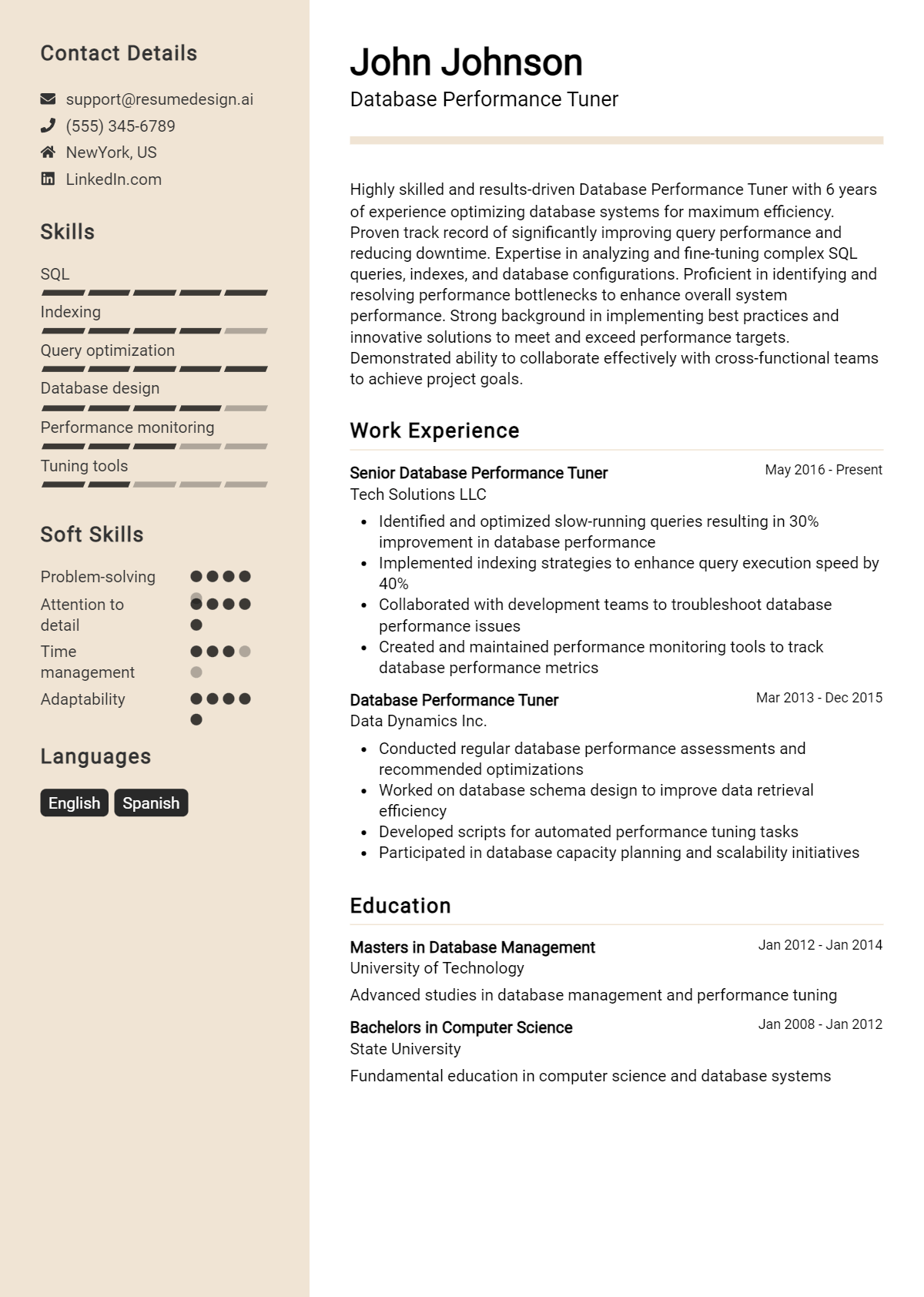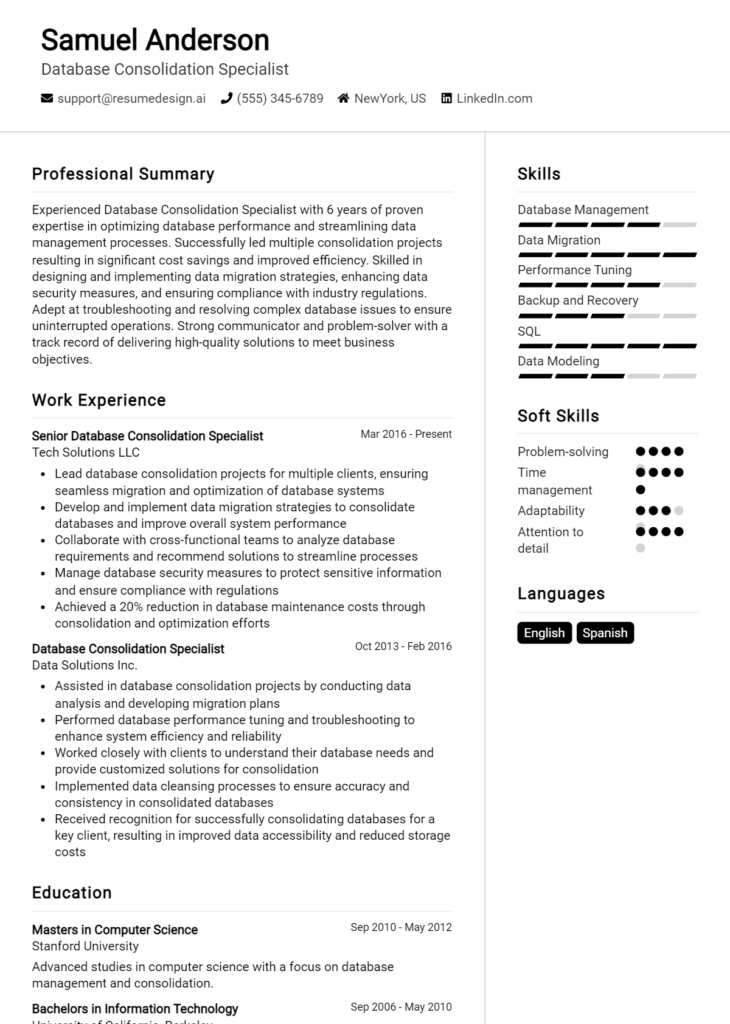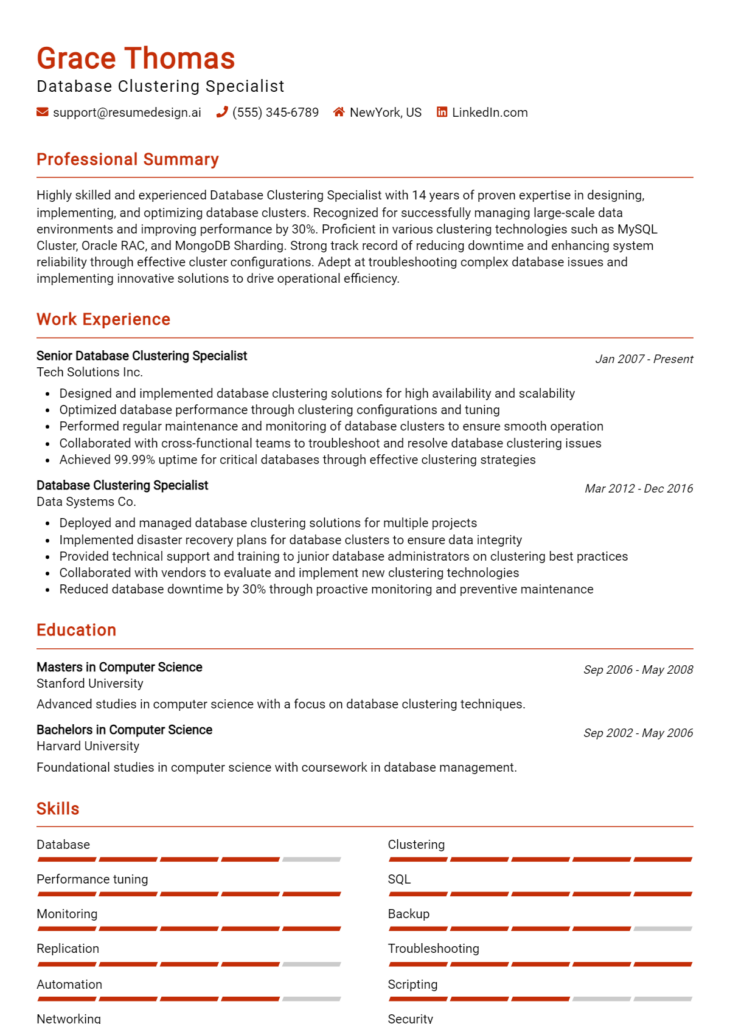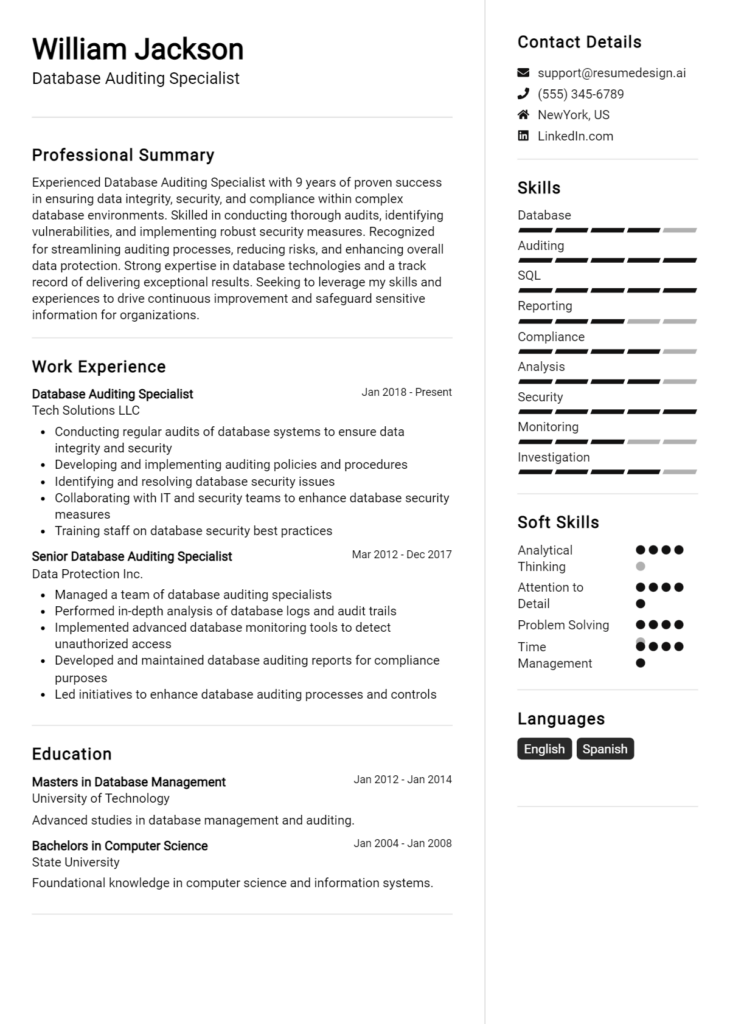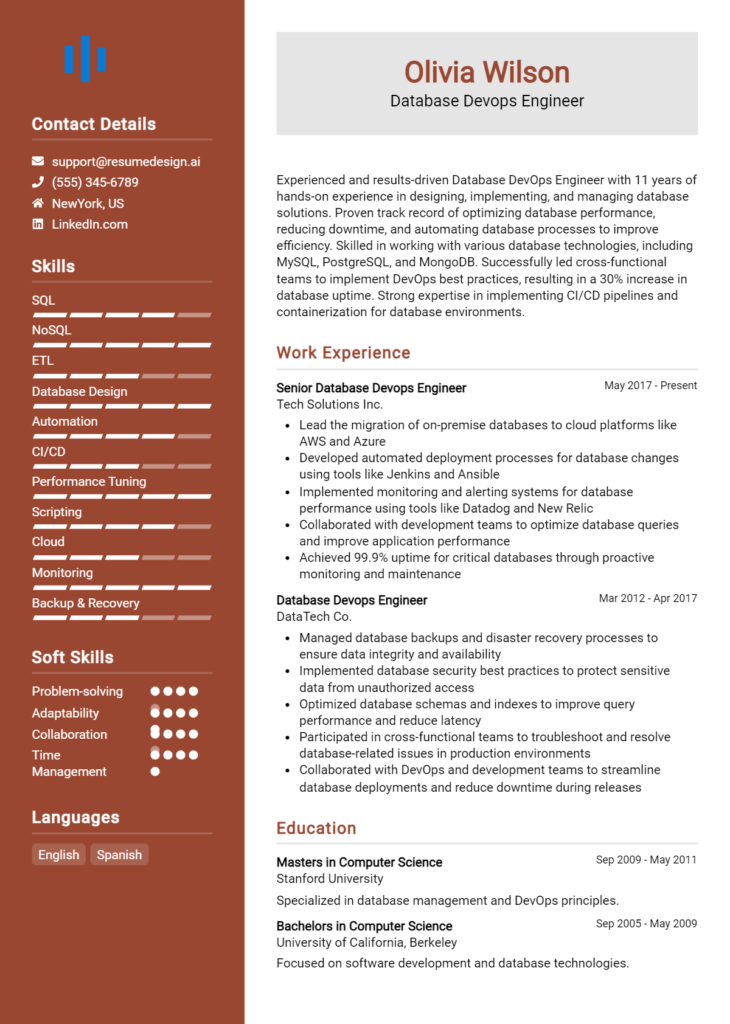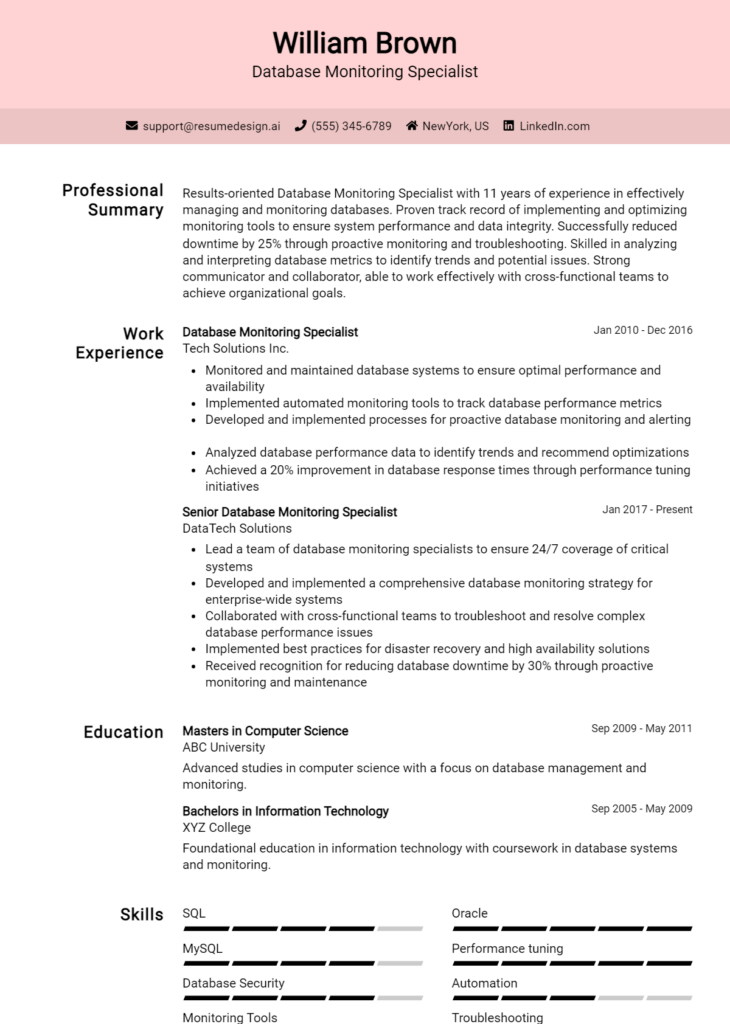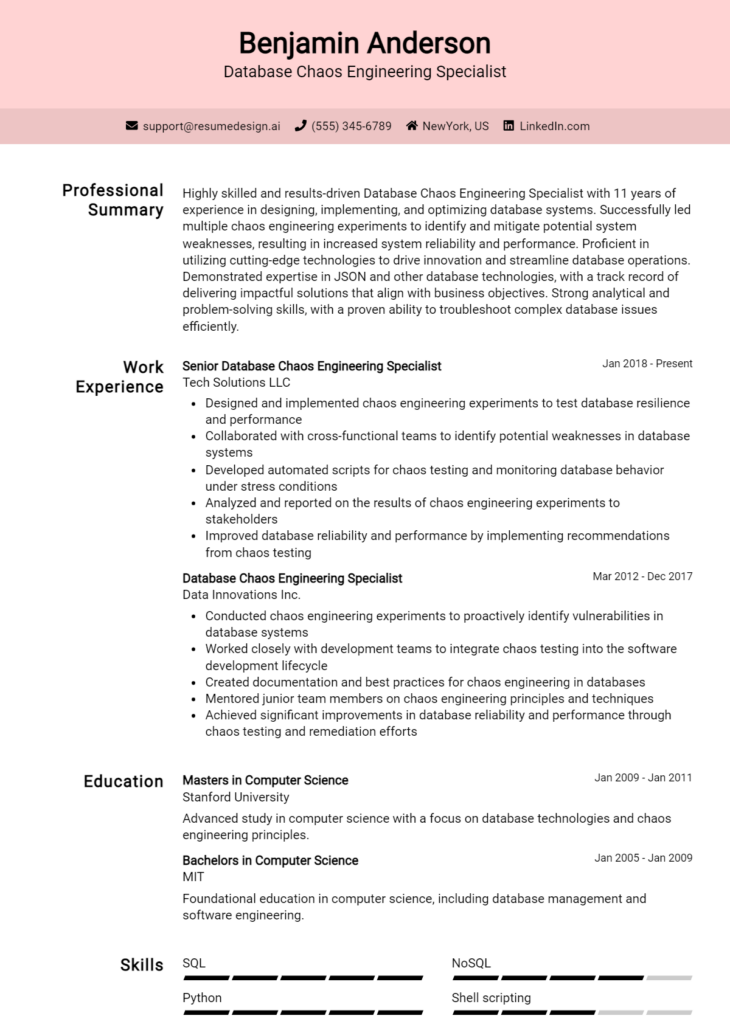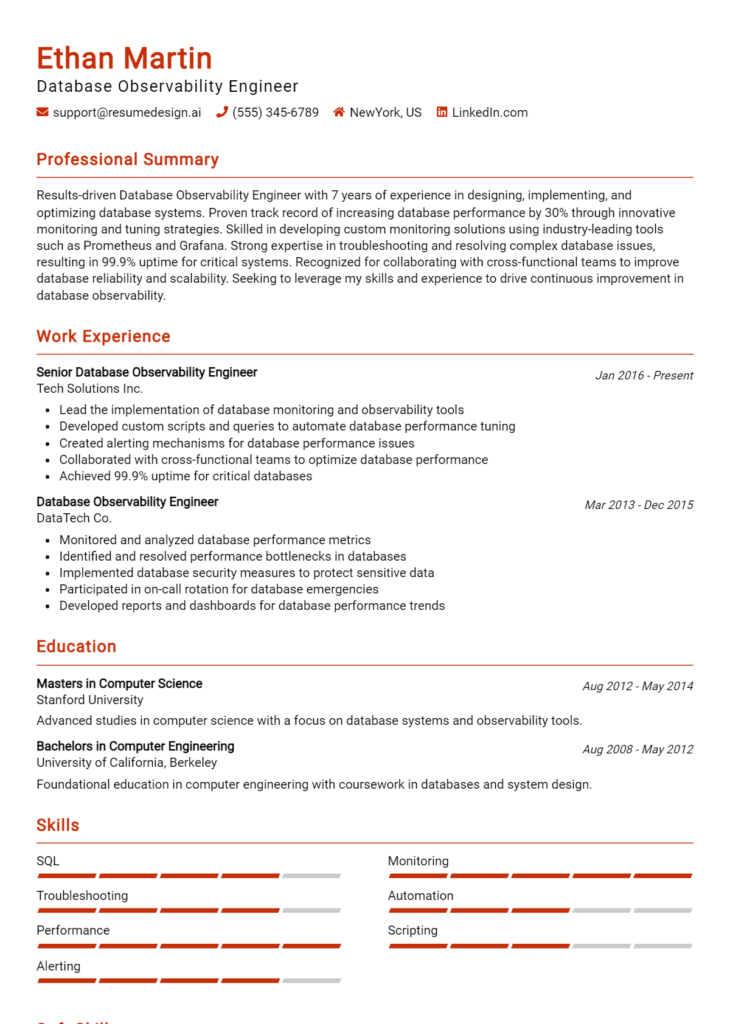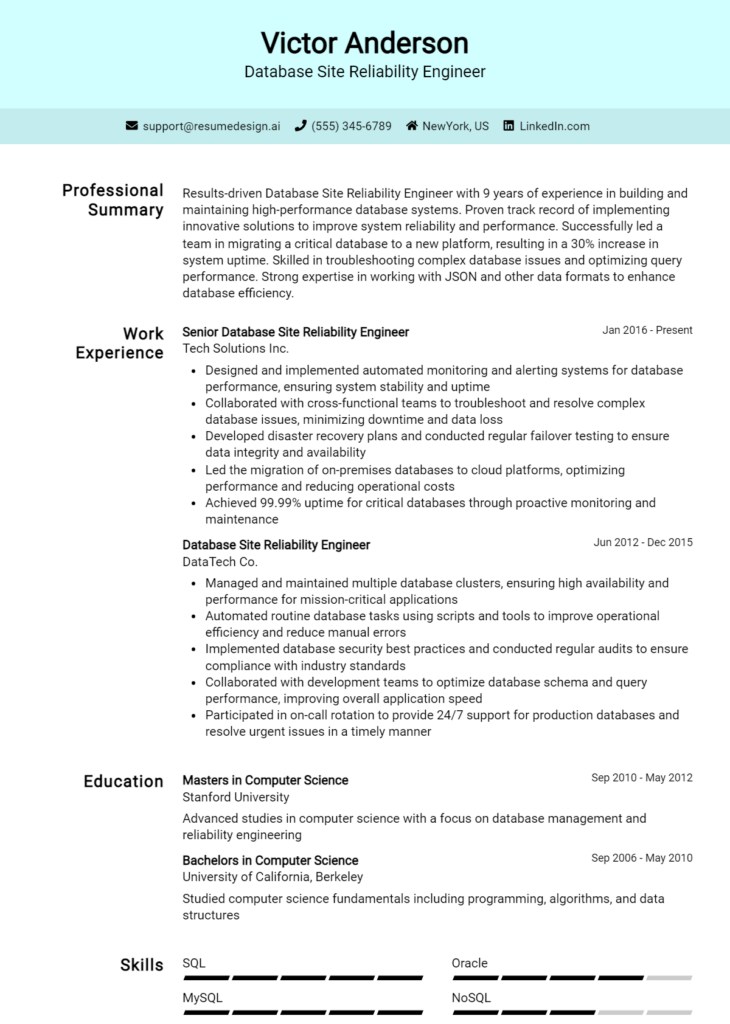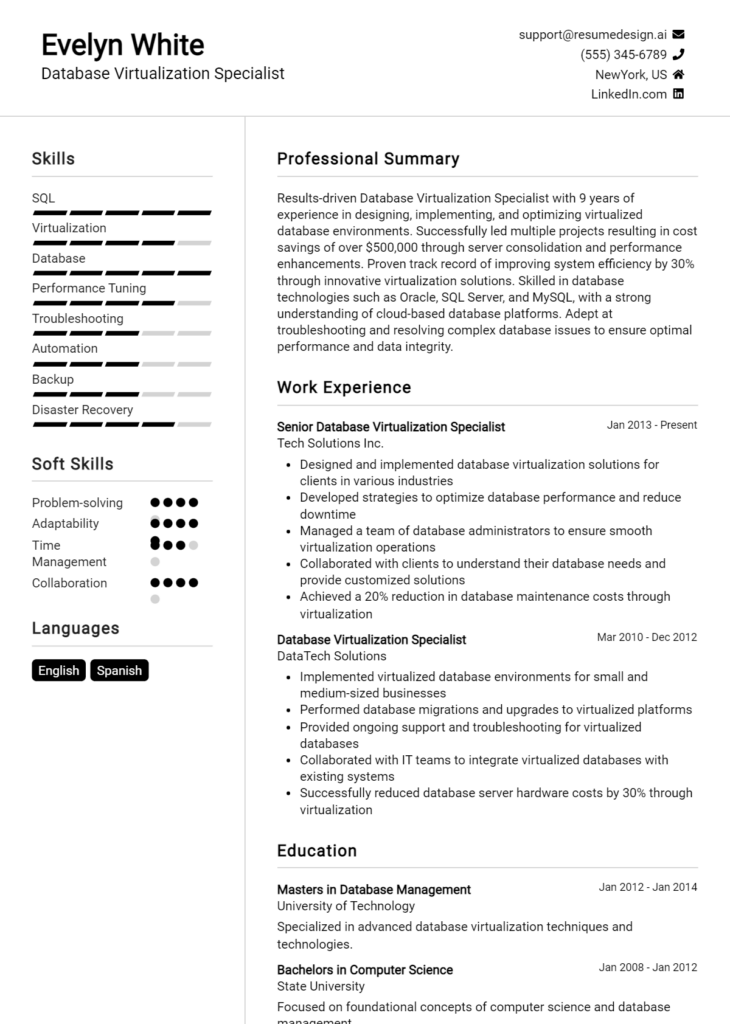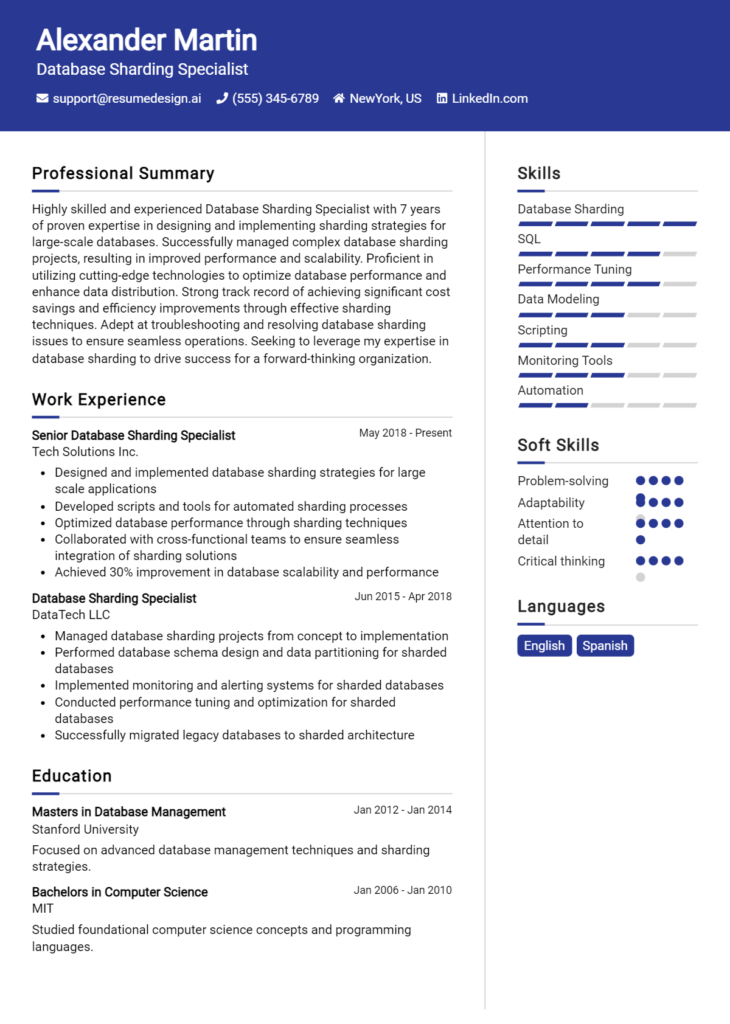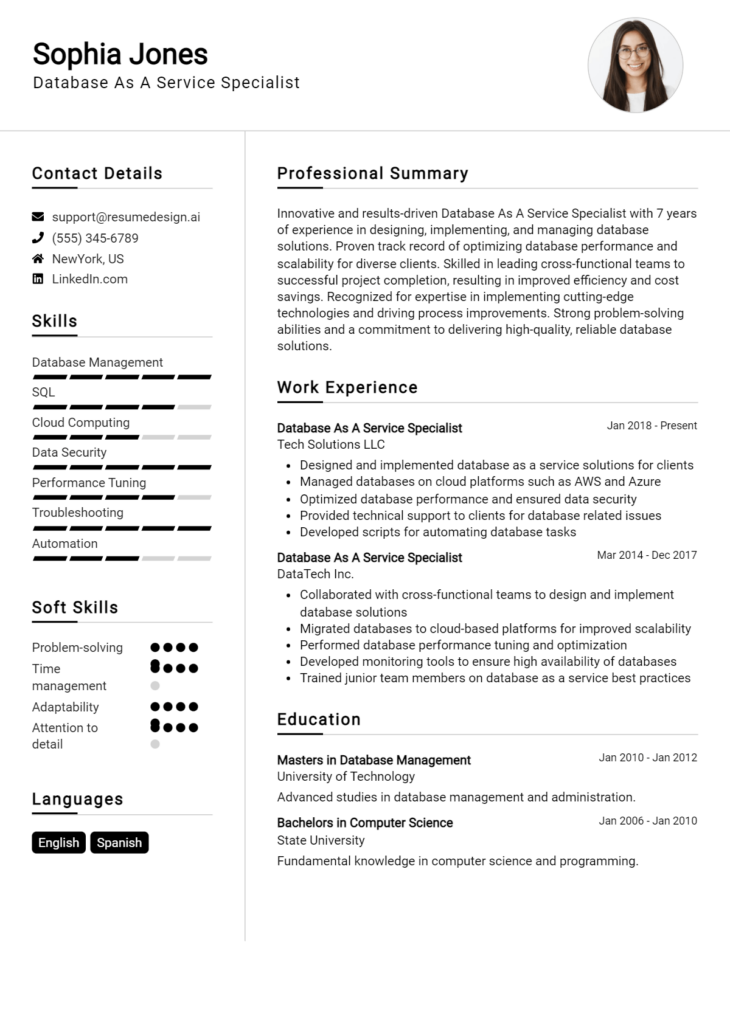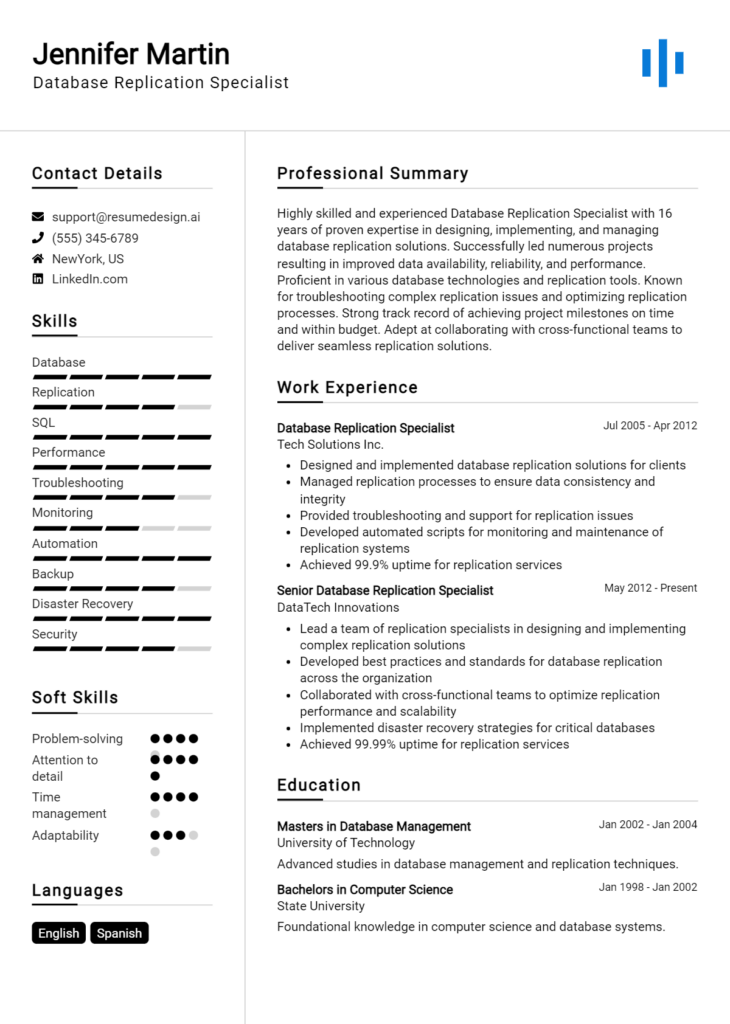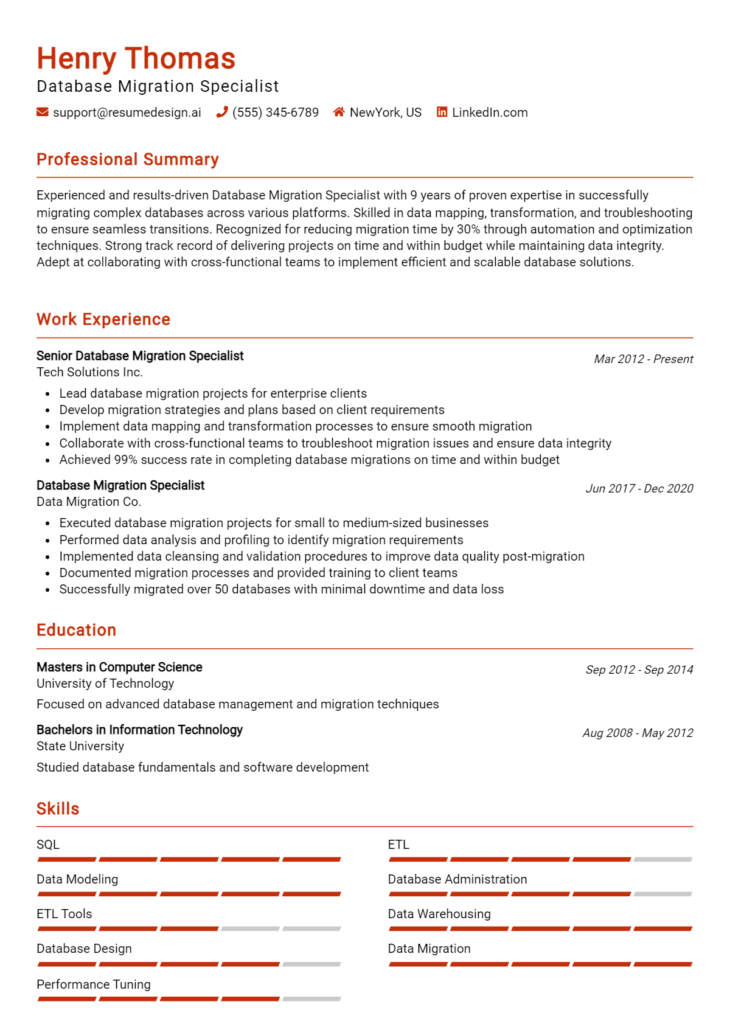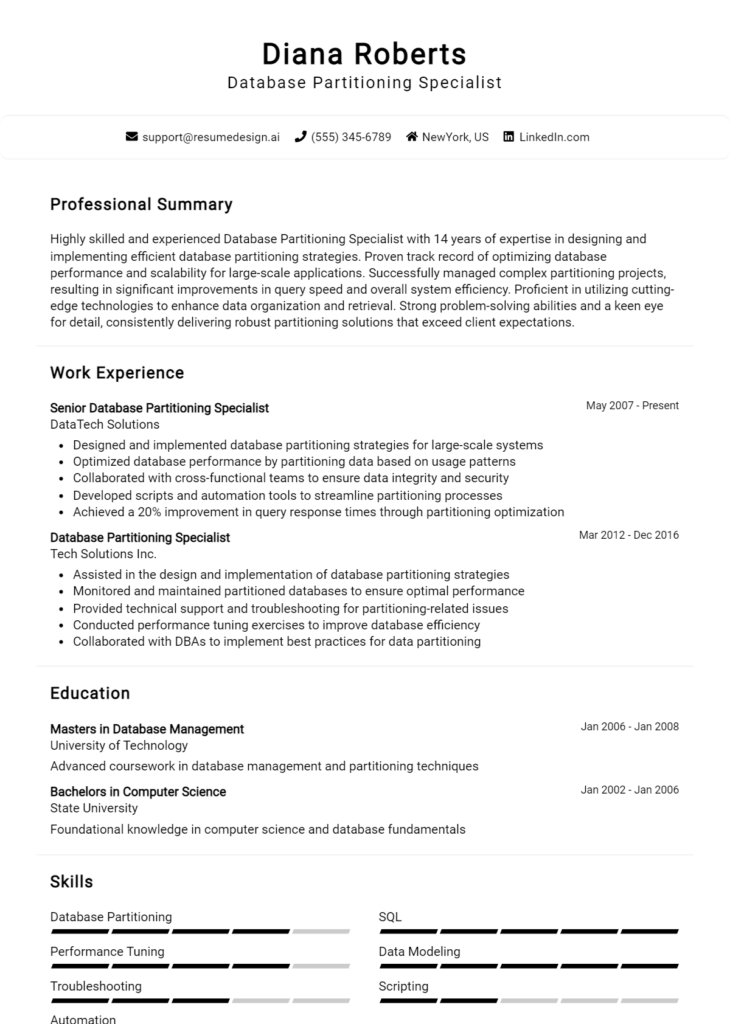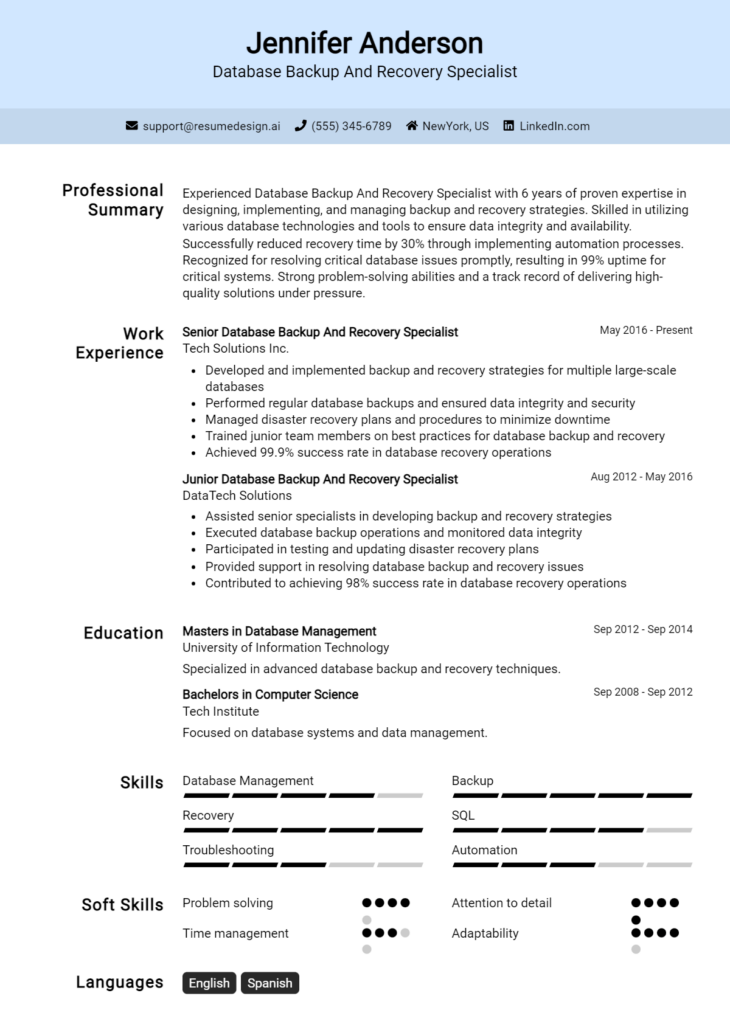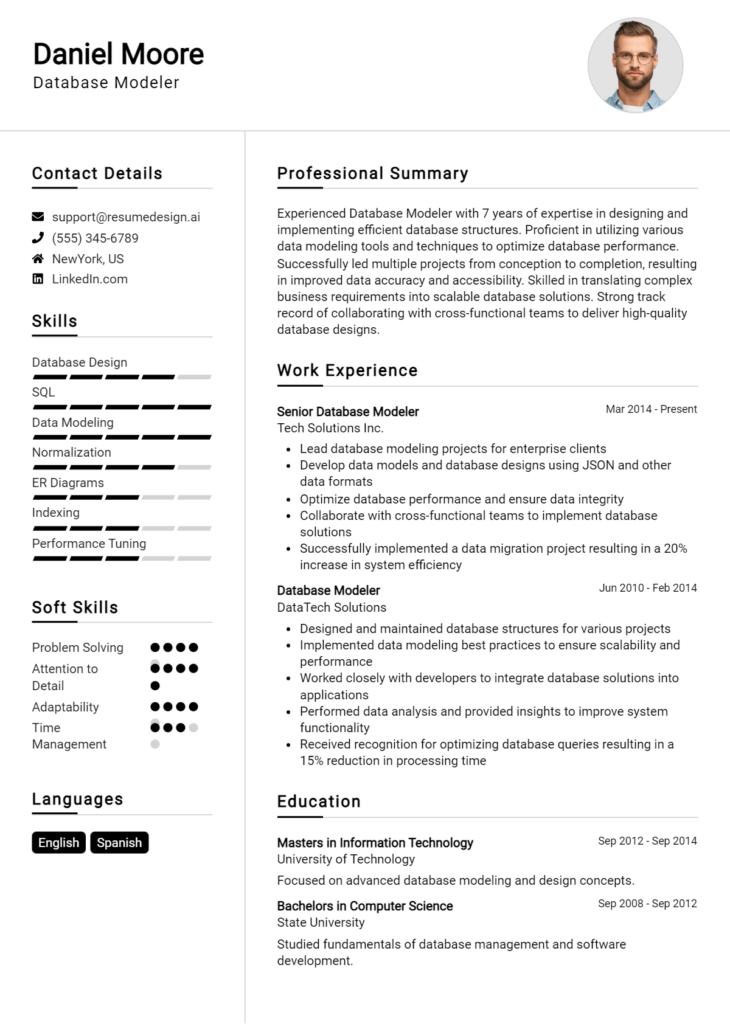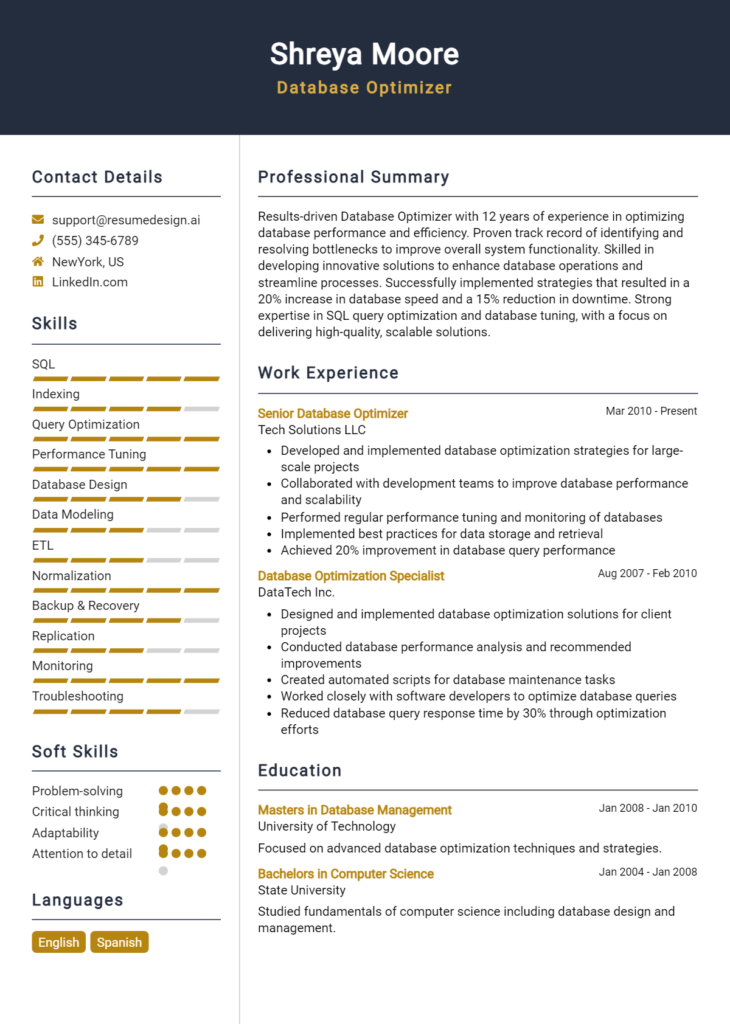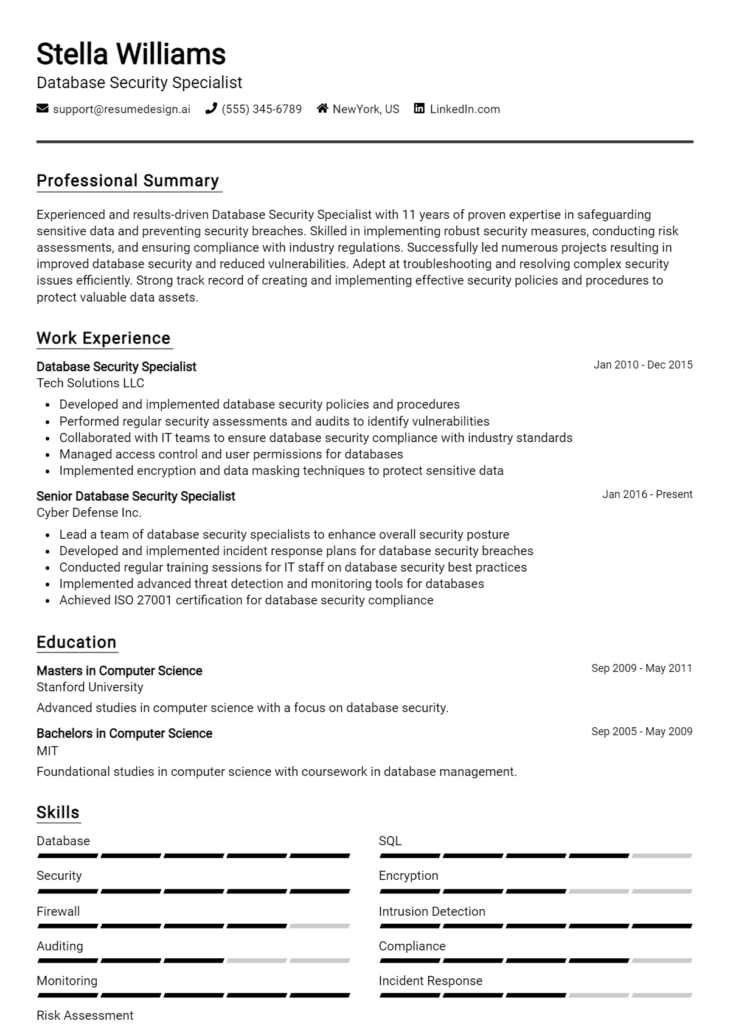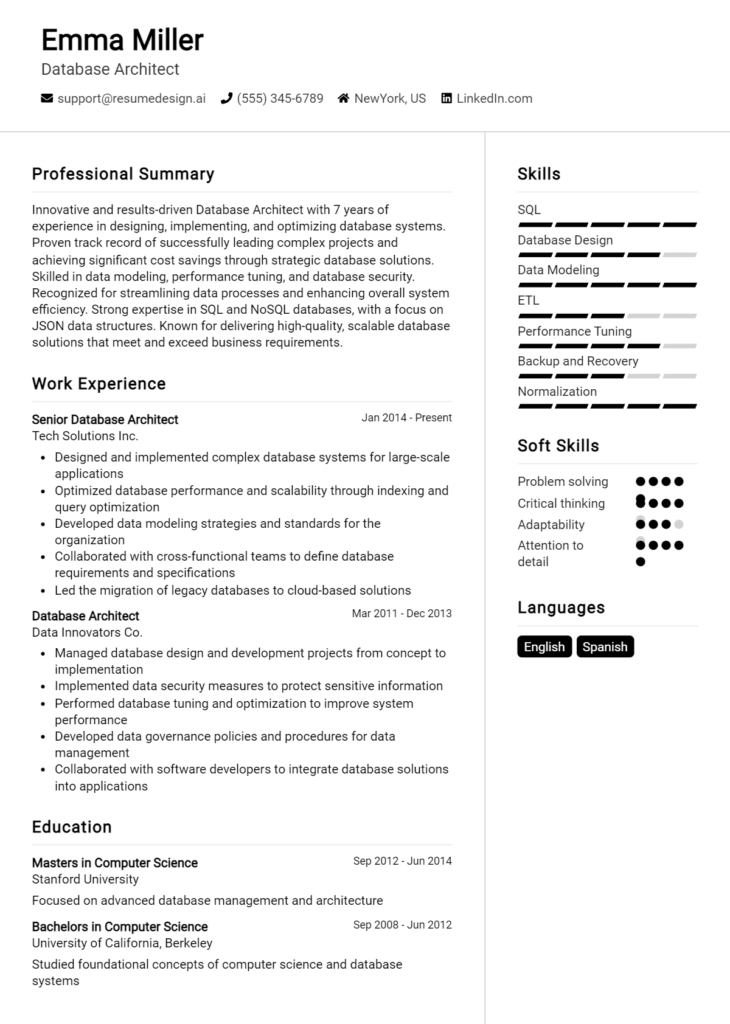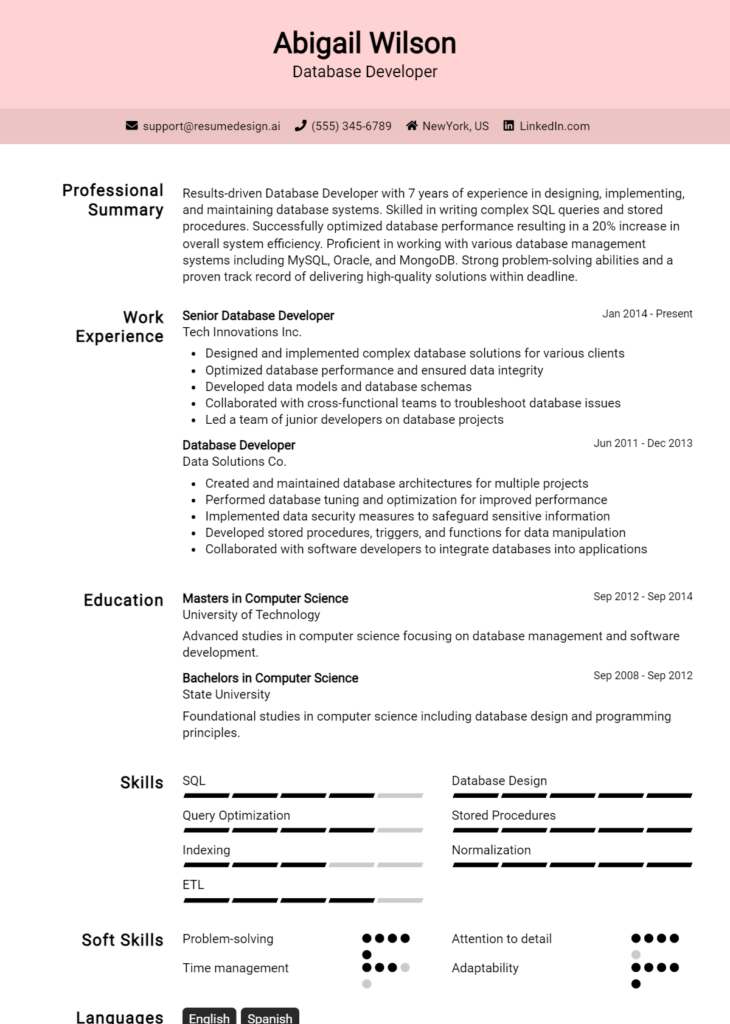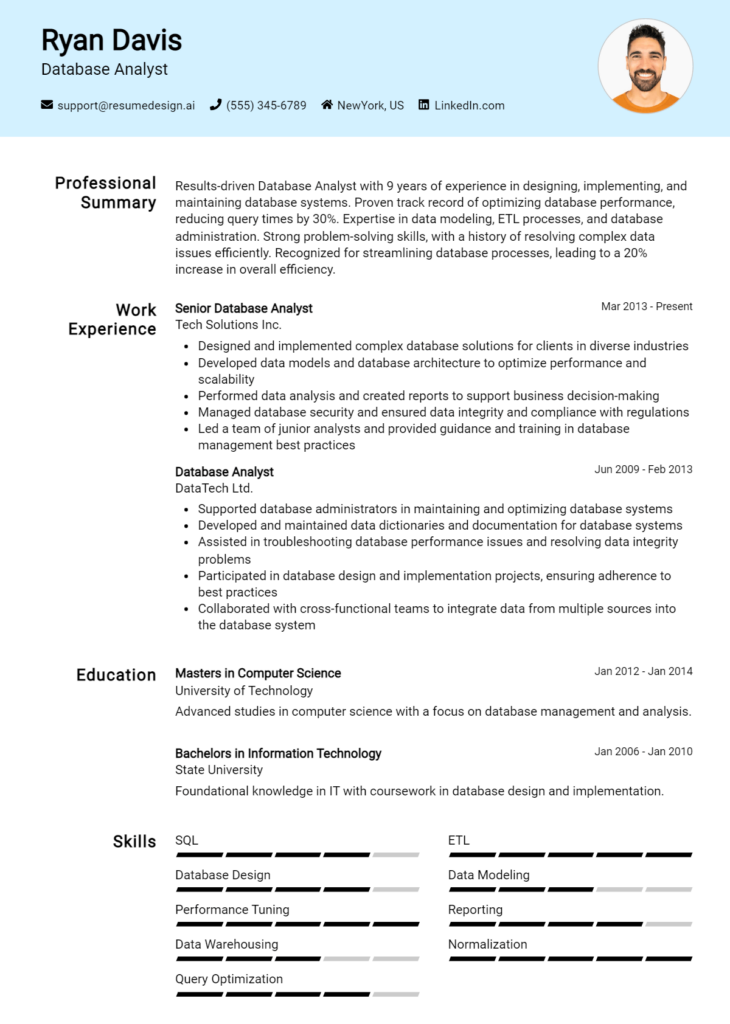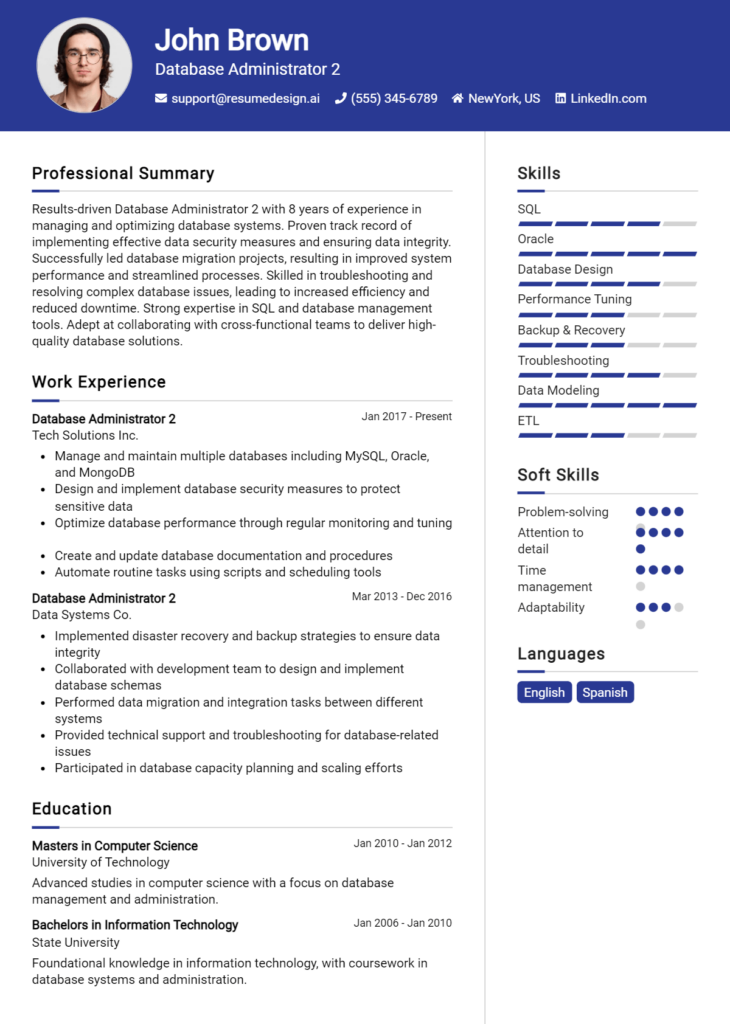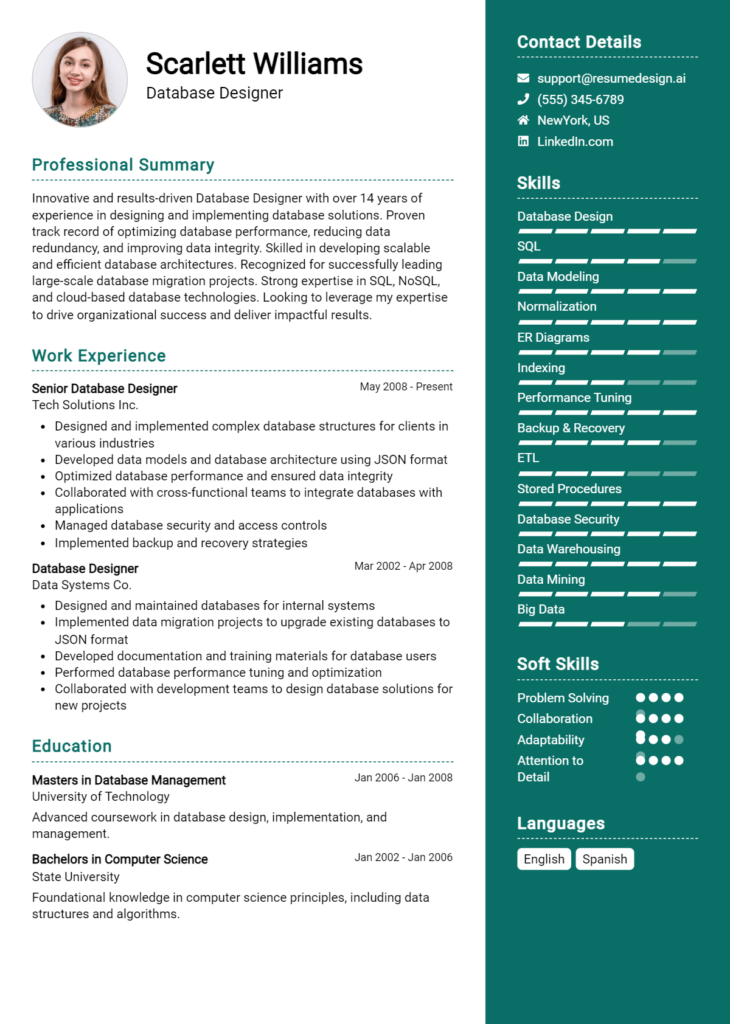Database Performance Tuner Core Responsibilities
A Database Performance Tuner is vital for optimizing database systems, ensuring efficient data retrieval and processing. Key responsibilities include analyzing query performance, implementing indexing strategies, and collaborating with development and IT teams to resolve performance bottlenecks. Essential skills encompass technical expertise in SQL, operational knowledge of database architecture, and strong problem-solving abilities, which collectively contribute to enhancing organizational efficiency. A well-structured resume can effectively highlight these qualifications, showcasing the candidate’s impact on overall business objectives.
Common Responsibilities Listed on Database Performance Tuner Resume
- Analyze and optimize SQL queries for improved performance.
- Implement and manage indexing strategies.
- Monitor database performance and identify bottlenecks.
- Collaborate with development teams to optimize application data access.
- Conduct regular database health checks and capacity planning.
- Troubleshoot and resolve database performance issues.
- Perform database tuning using statistical analysis and performance metrics.
- Document performance tuning processes and best practices.
- Research and implement new database technologies and solutions.
- Provide training and support to team members on performance tuning techniques.
- Work with stakeholders to align database performance with business objectives.
High-Level Resume Tips for Database Performance Tuner Professionals
A well-crafted resume is crucial for Database Performance Tuner professionals as it serves as the first impression a candidate makes on potential employers. In a competitive field where technical expertise and problem-solving abilities are paramount, your resume must not only showcase your skills but also highlight your achievements in optimizing database performance. It is essential to create a document that reflects your unique qualifications and demonstrates your value to prospective employers. This guide will provide practical and actionable resume tips specifically tailored for Database Performance Tuner professionals, ensuring that your resume stands out in the hiring process.
Top Resume Tips for Database Performance Tuner Professionals
- Tailor your resume to the job description by using relevant keywords and phrases that reflect the specific requirements of the position.
- Highlight your experience with various database management systems (DBMS) such as SQL Server, Oracle, and MySQL, and specify the versions you’ve worked with.
- Quantify your achievements by including metrics such as percentage improvements in query performance, reduction in downtime, or cost savings realized through optimization efforts.
- Showcase your problem-solving skills by detailing specific challenges you faced in previous roles and how you successfully addressed them.
- Emphasize your familiarity with performance tuning tools and techniques, such as indexing strategies, query optimization, and database partitioning.
- Include relevant certifications, such as Oracle Certified Professional or Microsoft Certified Database Administrator, to validate your expertise in the field.
- Incorporate a summary statement at the top of your resume that succinctly outlines your key qualifications and career objectives.
- Use a clean, professional format with clear headings and bullet points to enhance readability and ensure key information stands out.
- List any experience with cloud databases and big data technologies, as these are increasingly important in the database management landscape.
- Consider including a section for ongoing education or professional development to demonstrate your commitment to staying current in the field.
By implementing these tips, you can significantly increase your chances of landing a job in the Database Performance Tuner field. A well-structured resume that clearly articulates your skills, achievements, and relevant experience will not only catch the attention of hiring managers but also position you as a strong candidate for the role.
Why Resume Headlines & Titles are Important for Database Performance Tuner
In the competitive field of database management, the role of a Database Performance Tuner is critical to ensuring optimal performance and efficiency of database systems. A well-crafted resume headline or title can serve as an immediate hook that grabs the attention of hiring managers, summarizing a candidate's key qualifications and expertise in a concise phrase. This brief yet powerful statement should be relevant and directly related to the position being applied for, allowing potential employers to quickly assess the candidate's fit for the role. An impactful headline not only enhances the overall presentation of the resume but also sets the tone for the qualifications that follow.
Best Practices for Crafting Resume Headlines for Database Performance Tuner
- Keep it concise: Aim for one impactful phrase that conveys your expertise.
- Make it role-specific: Use terminology and keywords relevant to Database Performance Tuning.
- Highlight key strengths: Focus on your most significant skills or accomplishments.
- Use action-oriented language: Start with powerful verbs to convey proactivity.
- Avoid jargon: Ensure clarity by avoiding overly technical terms that may confuse.
- Tailor for each application: Customize your headline to match the job description.
- Include quantifiable achievements: If possible, incorporate numbers to showcase impact.
- Be professional: Maintain a formal tone suitable for the industry.
Example Resume Headlines for Database Performance Tuner
Strong Resume Headlines
"Expert Database Performance Tuner with 10+ Years of Experience in Optimizing SQL Queries"
“Proven Track Record in Reducing Database Response Times by 40% Through Innovative Tuning Strategies”
“Senior Database Performance Specialist with Expertise in Oracle and MySQL Performance Optimization”
Weak Resume Headlines
“Database Expert”
“Tuner of Databases”
Strong resume headlines are effective because they clearly articulate the candidate's unique value proposition and specific expertise, making it easy for hiring managers to see why they should be considered for the role. In contrast, weak headlines often lack specificity and fail to convey essential qualifications, resulting in a missed opportunity to make a memorable first impression. By avoiding generic titles and focusing on impactful, role-specific phrases, candidates can significantly enhance their chances of standing out in a crowded job market.
Writing an Exceptional Database Performance Tuner Resume Summary
A resume summary is a crucial component for a Database Performance Tuner, serving as the first impression a candidate makes on potential employers. It succinctly showcases key skills, relevant experience, and notable accomplishments, allowing hiring managers to quickly assess the candidate's fit for the role. A well-crafted summary not only grabs attention but also sets the tone for the rest of the resume. It should be concise, impactful, and meticulously tailored to align with the specific job description, ensuring that the candidate stands out in a competitive job market.
Best Practices for Writing a Database Performance Tuner Resume Summary
- Quantify Achievements: Use specific metrics to demonstrate the impact of your work, such as improved query performance by a certain percentage.
- Focus on Skills: Highlight technical skills relevant to database performance tuning, including optimization techniques, SQL proficiency, and knowledge of database management systems.
- Tailor for the Job Description: Customize your summary to reflect keywords and requirements outlined in the job posting.
- Be Concise: Aim for 2-4 sentences that encapsulate your professional identity and key accomplishments without unnecessary detail.
- Use Action Verbs: Start sentences with strong action verbs to convey a sense of urgency and proactivity, such as "optimized," "analyzed," and "improved."
- Showcase Relevant Experience: Briefly mention your years of experience in database performance tuning or related fields.
- Highlight Certifications: If applicable, include any relevant certifications that enhance your credibility in database performance tuning.
- Demonstrate Problem-Solving: Allude to specific challenges you've addressed and how your solutions benefitted past employers.
Example Database Performance Tuner Resume Summaries
Strong Resume Summaries
Results-driven Database Performance Tuner with over 7 years of experience optimizing large-scale databases. Achieved a 35% reduction in query response times through targeted indexing and query rewriting techniques.
Detail-oriented performance specialist with expertise in SQL tuning and database diagnostics. Successfully improved system performance by 50% for a financial services client, leading to a 20% increase in operational efficiency.
Dynamic Database Performance Tuner skilled in employing performance monitoring tools to enhance system efficiency. Recognized for reducing downtime by 40% through proactive performance analysis and tuning initiatives.
Dedicated professional with a proven track record in database optimization and capacity planning. Spearheaded a project that improved data retrieval times by 30%, significantly enhancing user satisfaction and system reliability.
Weak Resume Summaries
Experienced database professional with some skills in performance tuning and optimization.
Database Performance Tuner looking for a new opportunity to use my skills and experience.
The strong resume summaries effectively highlight quantifiable achievements, specific skills, and relevant experience, showcasing the candidate's value to prospective employers. In contrast, the weak summaries lack detail, specificity, and measurable outcomes, making it difficult for hiring managers to assess the candidate's qualifications and fit for the role. A compelling summary should always present the candidate in the best light, combining relevant metrics with clear skills to attract attention in a crowded job market.
Work Experience Section for Database Performance Tuner Resume
The work experience section of a Database Performance Tuner resume is critical, as it serves as a showcase for the candidate's technical skills, leadership capabilities, and history of delivering high-quality outcomes. This section not only highlights a candidate’s proficiency in optimizing database systems but also demonstrates their ability to manage teams and collaborate effectively across departments. By quantifying achievements and aligning experiences with industry standards, candidates can significantly enhance their appeal to potential employers, illustrating their value in improving performance and efficiency within database environments.
Best Practices for Database Performance Tuner Work Experience
- Focus on quantifiable results by including specific metrics, such as improved query performance percentages or reduced load times.
- Highlight relevant technical skills, such as proficiency in SQL tuning, indexing strategies, or database architecture.
- Showcase leadership roles, emphasizing experience in mentoring junior team members or leading optimization projects.
- Describe collaborative efforts with cross-functional teams, illustrating how teamwork contributed to achieving performance goals.
- Align your experiences with industry standards and best practices, demonstrating your knowledge of current trends and technologies.
- Use action verbs to convey initiative and impact, such as 'developed', 'optimized', or 'implemented'.
- Include specific tools and technologies used, such as database management systems (DBMS) and performance monitoring tools.
- Keep descriptions concise but detailed enough to convey the complexity and significance of your contributions.
Example Work Experiences for Database Performance Tuner
Strong Experiences
- Led a team of 5 in a project that reduced database query response times by 40%, enhancing overall application performance for over 10,000 users.
- Implemented a new indexing strategy that resulted in a 30% decrease in data retrieval times, leading to improved user satisfaction and retention rates.
- Collaborated with software engineers to redesign database architecture, which improved data integrity and reduced downtime by 25%.
- Conducted regular performance audits, identifying and resolving bottlenecks that improved system efficiency by 50% across critical applications.
Weak Experiences
- Worked on database performance issues as part of a team.
- Helped with some database tuning tasks without specific outcomes mentioned.
- Participated in meetings regarding database optimization.
- Assisted in troubleshooting problems occasionally.
The examples listed as strong experiences are considered such because they provide quantifiable outcomes, demonstrate technical leadership, and highlight collaborative efforts that resulted in significant improvements. In contrast, the weak experiences are vague and lack specific details, metrics, or direct impact, making them less compelling to potential employers. Strong examples make it clear how the candidate contributed to their organization’s success, while weak examples do not convey a sense of accomplishment or technical expertise.
Education and Certifications Section for Database Performance Tuner Resume
The education and certifications section of a Database Performance Tuner resume is crucial for showcasing a candidate's academic qualifications and commitment to professional development in the field of database management. This section not only highlights formal educational achievements but also emphasizes relevant industry certifications and ongoing learning endeavors. By providing details about pertinent coursework, specialized training, and recognized credentials, candidates can significantly enhance their credibility and demonstrate alignment with the expectations of the job role. In a competitive job market, a well-structured education and certifications section can set a candidate apart, signaling their expertise and dedication to optimizing database performance.
Best Practices for Database Performance Tuner Education and Certifications
- Prioritize relevant degrees such as Computer Science, Information Technology, or Database Management.
- Include industry-recognized certifications, such as Oracle Certified Professional or Microsoft Certified: Azure Database Administrator Associate.
- Detail specific coursework that directly relates to database performance tuning, such as Database Optimization, SQL Performance, and Data Warehousing.
- Highlight any specialized training programs or workshops that focus on advanced tuning techniques and tools.
- Ensure that certifications are current and reflect the latest industry standards and practices.
- Use clear and concise language to describe educational accomplishments, avoiding jargon where possible.
- Consider including continuing education courses that demonstrate a commitment to lifelong learning.
- List any relevant projects or practical experiences that enhance your educational qualifications.
Example Education and Certifications for Database Performance Tuner
Strong Examples
- Bachelor of Science in Computer Science, University of XYZ, Graduated 2020
- Oracle Certified Professional (OCP) - Database Administrator, 2021
- SQL Performance Tuning Workshop, Completed 2022
- Master's Degree in Data Analytics, University of ABC, Expected Graduation 2024
Weak Examples
- Bachelor of Arts in English Literature, University of XYZ, Graduated 2019
- Certification in Basic Computer Skills, Issued 2018
- High School Diploma, Graduated 2015
- Old version of Microsoft Certified Database Administrator (MCDBA), obtained in 2010
The examples provided illustrate a clear distinction between strong and weak qualifications for a Database Performance Tuner. Strong examples reflect relevant degrees, up-to-date certifications, and specialized training that align with the demands of the role, demonstrating the candidate's capability in database performance tuning. In contrast, weak examples showcase irrelevant or outdated qualifications that do not contribute to the candidate's credibility or expertise in the field, ultimately hindering their competitiveness in the job market.
Top Skills & Keywords for Database Performance Tuner Resume
In the competitive field of database management, the role of a Database Performance Tuner is vital for ensuring that databases operate efficiently and effectively. A well-crafted resume that reflects both hard and soft skills is essential to stand out in this specialized field. Employers look for candidates who not only have technical expertise but also possess strong interpersonal abilities to communicate and collaborate with team members. Highlighting a balanced mix of these skills can significantly enhance a resume, showcasing a candidate's comprehensive understanding of database optimization and their ability to work within dynamic environments. For more insights on how to effectively present your skills and work experience, it's crucial to curate your resume thoughtfully.
Top Hard & Soft Skills for Database Performance Tuner
Soft Skills
- Analytical Thinking
- Problem Solving
- Attention to Detail
- Effective Communication
- Team Collaboration
- Time Management
- Adaptability
- Critical Thinking
- Initiative
- Stress Management
Hard Skills
- SQL Optimization
- Indexing Strategies
- Query Performance Tuning
- Database Monitoring Tools
- Performance Metrics Analysis
- Data Modeling
- Database Design Principles
- Knowledge of Database Systems (e.g., Oracle, SQL Server, MySQL)
- Backup and Recovery Techniques
- Familiarity with Cloud Database Solutions
Stand Out with a Winning Database Performance Tuner Cover Letter
Dear [Hiring Manager's Name],
I am writing to express my interest in the Database Performance Tuner position at [Company Name]. With over [X years] of experience in database management and performance optimization, I have developed a deep understanding of various database technologies and the intricate balance required to maintain optimal performance. My proven track record in identifying bottlenecks, implementing performance tuning strategies, and enhancing overall database efficiency aligns well with the goals of your team.
In my previous role at [Previous Company], I successfully improved database performance by [specific percentage or metric], utilizing advanced techniques such as indexing, query optimization, and partitioning. I am highly skilled in analyzing execution plans, identifying slow-running queries, and applying best practices to streamline database operations. My collaborative approach allows me to work effectively with cross-functional teams, ensuring that all stakeholders are aligned with performance goals and that solutions are implemented seamlessly.
I am particularly impressed with [Company Name]’s commitment to innovation and excellence in data management. I am eager to bring my expertise in performance tuning to your organization, helping to drive efficiency and support your mission to deliver exceptional database solutions. I am confident that my analytical mindset and attention to detail will contribute significantly to the success of your database initiatives.
Thank you for considering my application. I look forward to the opportunity to discuss how my skills and experiences align with the needs of your team. I am excited about the prospect of contributing to [Company Name] and helping to optimize your database performance for enhanced productivity and reliability.
Sincerely,
[Your Name]
[Your Contact Information]
Common Mistakes to Avoid in a Database Performance Tuner Resume
When crafting a resume for the role of a Database Performance Tuner, it's essential to present your skills and experiences in a clear and compelling manner. However, many candidates make common mistakes that can detract from their qualifications and diminish their chances of landing an interview. Here are several pitfalls to avoid when creating your resume:
Vague Job Descriptions: Using generic terms like "responsible for database management" fails to highlight your specific contributions. Focus on quantifiable achievements and technical skills.
Ignoring Relevant Skills: Failing to include specific tools and technologies relevant to database tuning, such as SQL performance tuning, indexing strategies, or query optimization, can make your resume less competitive.
Overloading with Technical Jargon: While technical expertise is crucial, overusing jargon without context can confuse hiring managers. Aim for a balance that showcases your knowledge while remaining accessible.
Lack of Results-Oriented Metrics: Not including measurable outcomes achieved through your tuning efforts diminishes the impact of your experience. Use metrics like "improved query performance by 30%" to demonstrate your effectiveness.
Neglecting Soft Skills: Database performance tuning isn't just about technical skills; communication and problem-solving abilities are equally important. Be sure to include examples that showcase these competencies.
Formatting Issues: A cluttered or inconsistent format can make it difficult for recruiters to read your resume. Use clear headings, bullet points, and a professional font to enhance readability.
Too Much Focus on Education: While education is important, overly emphasizing degrees without showcasing practical experience can weaken your resume. Prioritize experience and skills that highlight your ability to tune database performance effectively.
Failing to Tailor the Resume: Sending out a one-size-fits-all resume can hurt your chances. Tailor your resume for each job application by aligning your skills and experiences with the specific requirements of the position.
By avoiding these common mistakes, you can create a resume that effectively communicates your qualifications and makes a strong case for your candidacy as a Database Performance Tuner.
Conclusion
As a Database Performance Tuner, your role is crucial in ensuring that databases operate at optimal efficiency. You utilize various techniques and tools to analyze and enhance database performance, addressing issues like slow queries, resource contention, and inefficient indexing. The key responsibilities typically include monitoring database performance metrics, troubleshooting performance bottlenecks, and implementing best practices to improve system responsiveness.
In this competitive job market, having an outstanding resume can make all the difference in landing your dream position. It’s important to highlight your expertise in performance tuning, your familiarity with database management systems, and any relevant certifications or training. Remember to quantify your achievements where possible, showcasing how your tuning efforts have led to improved performance and reduced costs.
To ensure your resume stands out, take the time to review and refine it. Use available resources to enhance your application materials. Check out resume templates for a professional layout, utilize a resume builder to create a polished document quickly, and explore resume examples for inspiration. Don't forget the importance of a compelling cover letter; browse cover letter templates to make a strong first impression.
Take action now—review your Database Performance Tuner resume and leverage these tools to boost your chances of success in your job search!

